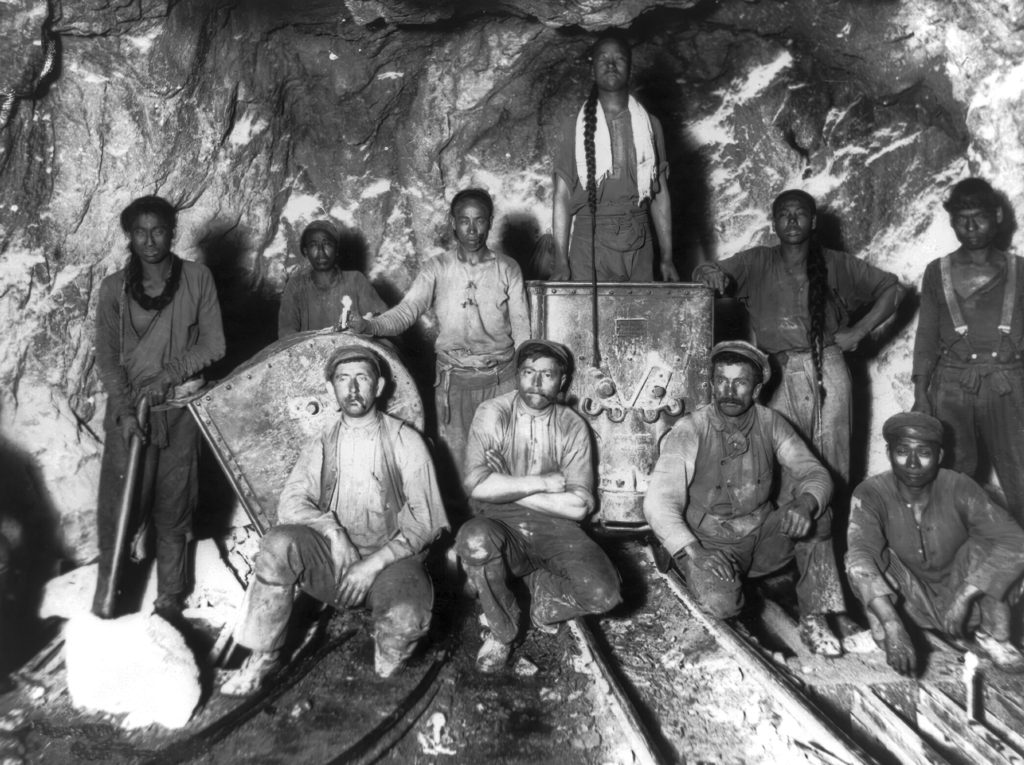
Elections Past: The Mining Division
Today my countrymen go to the polling stations to cast their vote for a new government. My ward is the Camborne and Redruth constituency. This roughly corresponds to the old Mining Division, and this got me thinking about the elections that took place at the dawn of the twentieth century: the bye-election of 1903 and the 1906 general election.
© Dr Sharron P. Schwartz
The burning issue back then was the question of introducing Chinese labour into the Transvaal gold mines in South Africa. These mines were perceived to be the lifeblood of the Mining Division which was experiencing the inexorable decline of its tin mining industry, and was hugely reliant on remittances sent home from men out ‘on the Rand’.
After the conclusion of the Boer War (1899-1902) which had shaken the Mining Division to its core, the British Government sought to rebuild the South African economy which had been devastated by the war. An important part of the rebuilding effort was to get the gold mines of the Witwatersrand (The Rand), which had been a major cause of the war, back into production as quickly as possible. The government felt that white labour was too expensive, and because black labourers were reluctant to return to the mines, the government decided to import over 60,000 contracted or ‘coolie’ labourers from China.
This naturally raised alarm bells in Camborne and Redruth, which had been ‘living off the back of the Rand’ for nearly two decades. After all, it was jokingly said at that time, that when the bell rings in South Africa, the call is answered in Cornwall.
In typical adversarial fashion, the two towns and their press mouthpieces, the Cornish Post and Mining News (Camborne) and the Cornubian (Redruth), took opposing views. Redruth newspaper the Cornubian took up the Radical (Liberal) cause. It was deeply suspicious of ‘Capitalist’ motives and wanted the Chinese, dubbed the ‘Yellow Peril’, kept out of the Transvaal Mines, arguing that they posed a threat to the Cornish miners’ preeminent position there by undercutting wages. At the same time, it took the moral high ground to appeal to Methodist voters, by arguing that to resist the introduction of ‘coolie’ labour was making a stand against ‘yellow slavery’.
The Camborne-based Cornish Post and Mining News came out in favour of the Unionist stance. The Unionist party was a coalition between the Tories and Liberal Unionists formed shortly before the 1895 general election, and looked more kindly on the hard-working and unfairly-maligned Chinese. The Cornish Post and Mining News argued that the lack of black labourers who performed tasks such as rock-breaking, shovelling and tramming, while the Cornish worked mainly in a supervisory capacity, or in highly skilled jobs such as setting explosives and operating rock drills, meant that Chinese labour was the only way to maintain productivity, thus safeguarding Cornish jobs.
The radical message won out. The Mining Division returned a majority for the Liberals in the 1903 election, bucking the national trend at the time which favoured the Unionists. But their victory was a hollow one, for the Chinese were introduced to the Transvaal Mines in 1904 where they remained for six years, causing the Cornubian to further agitate for their removal.
The discussion of this contentious issue in the contemporary local press was quite shocking. The language and cartoons were inflammatory and racist.
Even the Royal Cornwall Gazette joined in the fray, publishing this poem in 1903:
On the Rand the Cornish miner has resigned the pick and drill.
He sits upon the dump heaps and he sweareth with a will;
For up and down the shaft head come the gentlemen in blue.
The miners brought from China, by the men late of “Peru.”
In response to Israel’s call. Come the Chinkies “One and all.”
Back to Cornwall go the Cornish, Bag and baggage, “One and all.”
(Royal Cornwall Gazette, 11 June 1903)
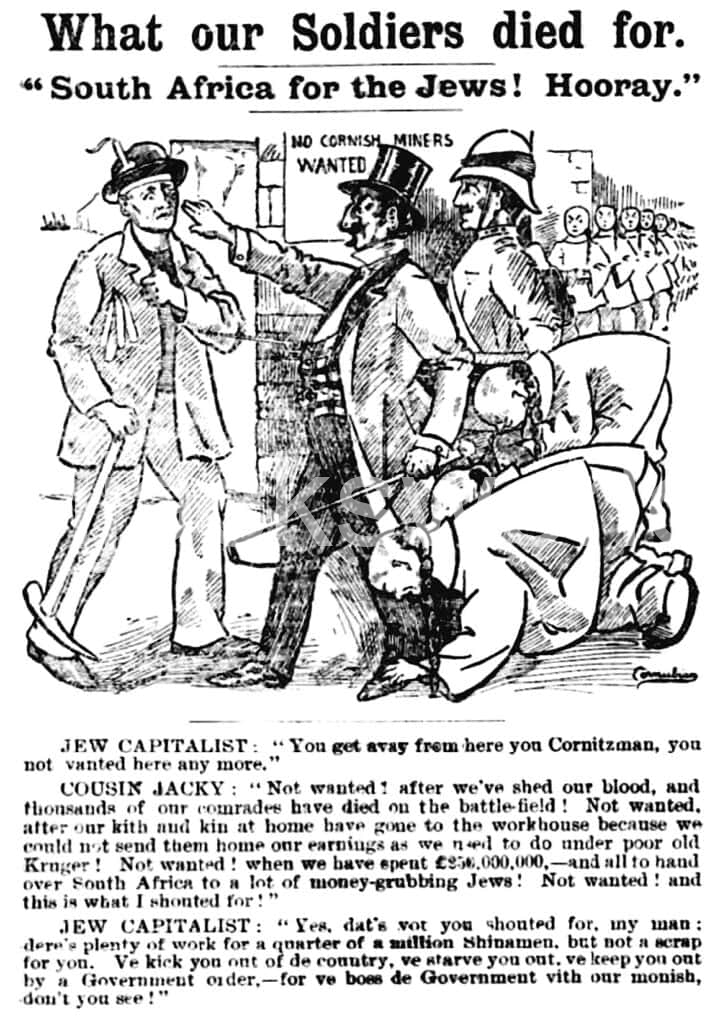
The above cartoon published in the Cornubian in 1904, plays on a stereotype of the Chinese as subservient and alien-looking with their long queues, while the Jewish ‘Randlords’ with their hooked noses are cast as predatory greedy capitalists, a typical anti-Semitic trope.
The term ‘men from Peru’ in the poem published in the Royal Cornwall Gazette was a term of abuse aimed at Jews. It has nothing to do with Peru at all, but is a reference to Jews who had immigrated to South Africa from Eastern Europe and had formed an organisation called in Yiddish the Polnischer und Russischer Yiddische Verein, abbreviated to PERUV. They were dubbed ‘Peruvnics’ which was anglicised to ‘Peruvians’.
The term seemed innocuous, but it was blatantly antisemitic. Moreover, it was particularly pernicious, as it conflated the poorest Jewish immigrants with the petit bourgeoise (merchants, shopkeepers and such) and the even wealthier Randlords who dominated South Africa’s diamond- and gold-mining industries before the First World War (and among whom Jews were well represented).
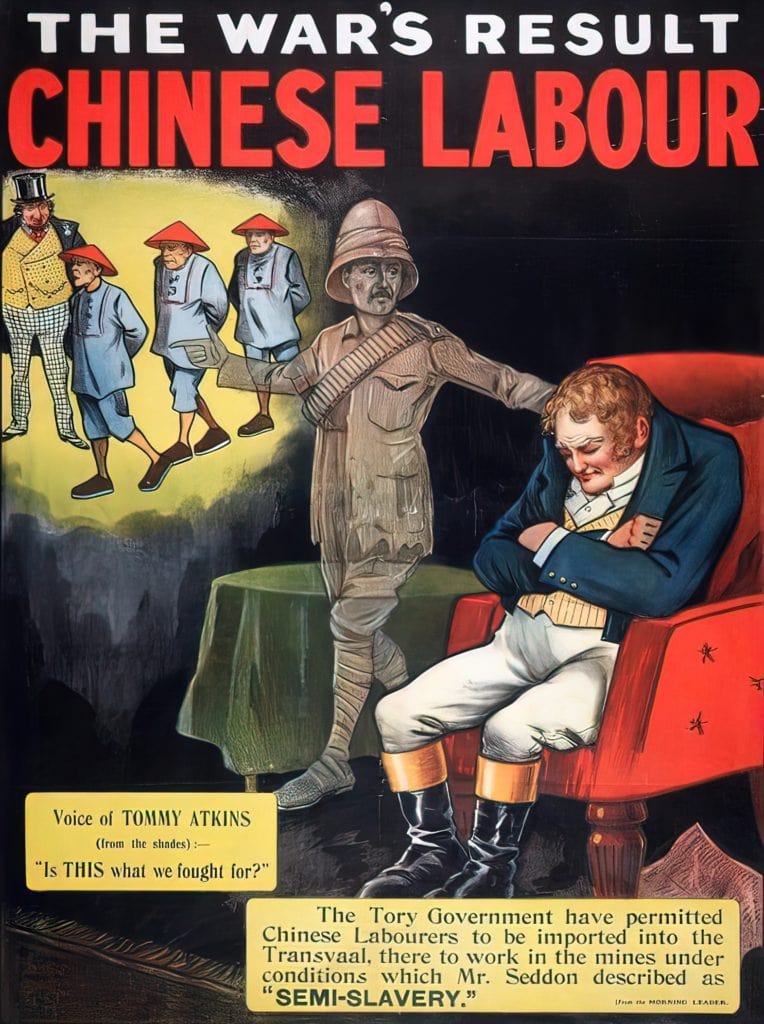
The 1906 General Election (held at the beginning of the year) during which the Randlords’ employment of Chinese labour on the Transvaal gold mines was highly controversial, contributed to the 1906 landslide victory for Henry Campbell-Bannerman’s Liberal party.
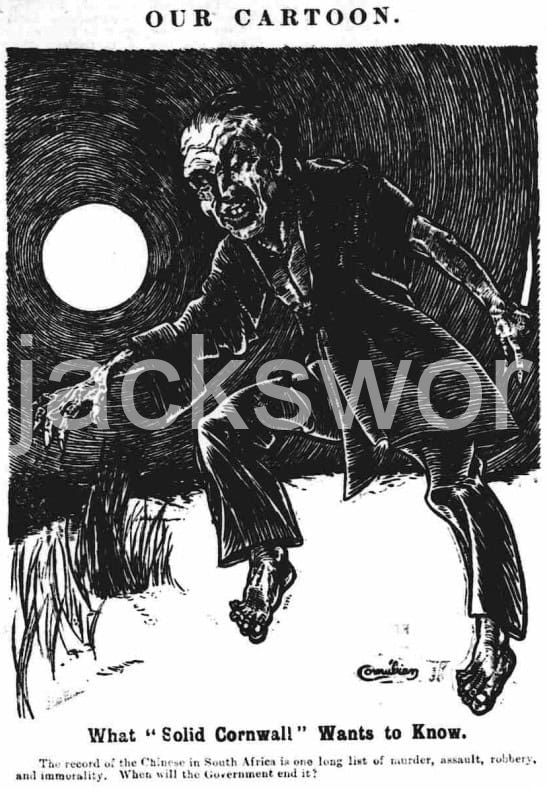
The Cornubian robustly challenged the new government over the Chinese question, urging it to put an end to coolie labour in South African mines:
The record of the Chinese in South Africa is one long list of murder, assault, robbery, and immorality. When will the government end it?
The accompanying cartoon depicting a Chinaman with clawed hands clutching a knife in front of a burning sun (a visual play on the term ‘celestials,’ an ethnic slur for the Chinese whose Emperors were styled the Son of Heaven) is grotesque.
A further cartoon published in 1906, is a declaration from the Liberal voters of Camborne to ‘Winny’ (Winston Churchill, who had gone over from the Tories to the Liberals in 1904), rudely telling him ‘to cut the cackle’ and ‘call a spade a spade and slavery slavery’.
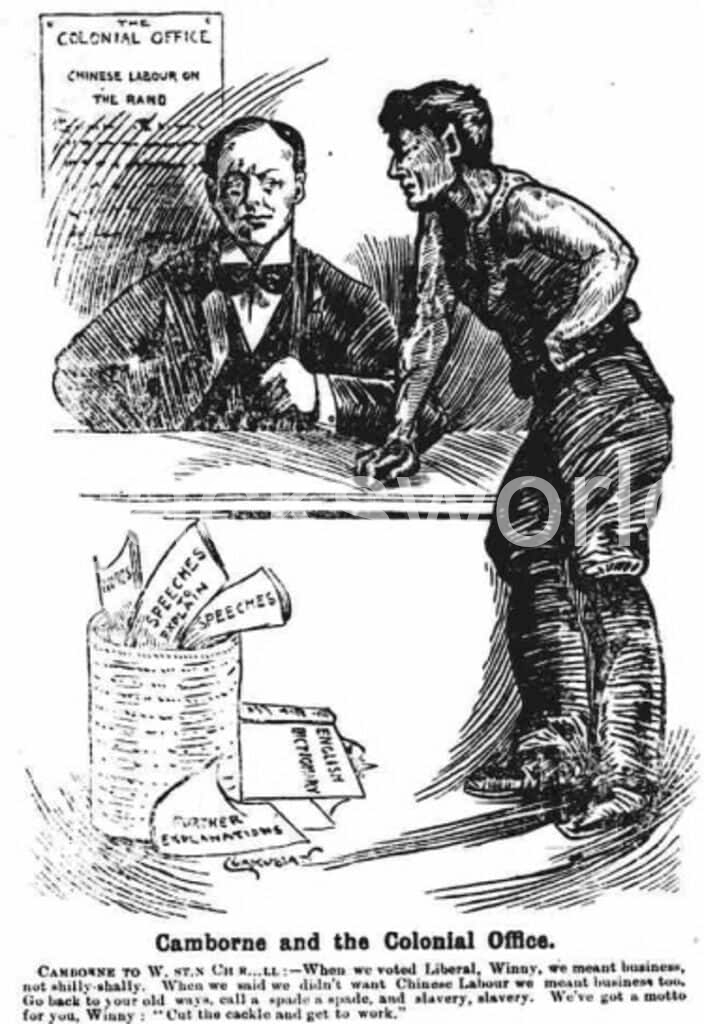
Politics has ever been a bear pit, and inflammatory and insensitive language is sadly nothing new. But I doubt such blatantly racist imagery would be permitted to be printed in the mainstream media today. I think it is fair to say that the elections of the early twentieth century were not the Mining Division’s finest hour.
Elections Past:
The Mining Division

Dr. Sharron Schwartz
Specialist in Cornish Mining Migration and transnational communities
